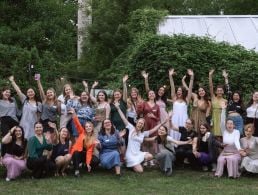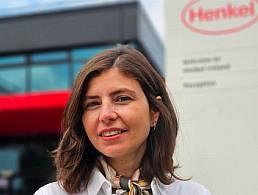FIT’s Women Choose Tech apprenticeship programme builds on the non-profit’s previous work to encourage diversity in Ireland’s tech industry.
Non-profit Fastrack into IT (FIT) is on a mission to grow Ireland’s tech talent pipeline and provide people traditionally underserved by the higher education system with career opportunities, training and apprenticeships.
Its latest apprenticeship programme focuses on increasing women’s involvement in the tech industry – a sector that has long suffered from a lack of diversity.
FIT established its Women Choose Tech apprenticeship programme this year specifically for women who want to get into the industry or further their career. The goal is to attain 33pc female participation in tech apprenticeships in Ireland by 2022.
The programme aims to build on partnerships with tech and other employers to encourage the recruitment of women apprentices in technology roles, provide supports for applicants considering a tech apprenticeship, and increase awareness of the opportunities available.
FIT tech apprentice officer Aisling Morgan and diversity and inclusion officer Clare Stewart told Siliconrepublic.com that they are optimistic about the charity’s future plans.
Stewart and Morgan said FIT was working with the Government on its recently launched Action Plan for Apprenticeship in a bid to inform policy on apprenticeships and higher education. The plan specifically mentions FIT’s all-female tech apprenticeship classes as an example of the development of “good practice”.
One of the key objectives of the Government’s plan is increased participation in apprentice programmes for all societal groups. This includes addressing barriers that might impact traditionally underrepresented groups such as women, lone parents, people with disabilities, young people and older adults experiencing socioeconomic disadvantages, people from the Traveller and Roma communities, young people at risk of offending and former prisoners.
Morgan and Stewart said FIT’s submission to the Government’s action plan was informed by multiple pieces of research, including FIT’s own internal ICT skills audit and a European Commission report on women in the digital age.
The latter, which was published in 2018, highlighted that women’s participation in the ICT and digital sectors was in decline. Women made up only 13pc of tech graduates in digital jobs in the EU in 2018, down from 15pc in 2011, which the report’s authors ascribed to “unconscious biases about what is appropriate and what capacities each gender has, as well as about the technologies themselves”.
According to Stewart, this was the main impetus for FIT to conduct its own skills audit in Ireland in the same year. This found that 36pc of respondents, most of which were based in the Dublin area, identified the lack of gender diversity as a problem within their companies.
‘It’s not just Microsoft and Google that need tech people’
The new Women Choose Tech apprenticeship programme is heavily informed by this research, as were previous programmes FIT offered to women.
The demand for tech professionals is something all companies are familiar with nowadays. Morgan’s role involves dealing with companies who take on FIT apprentices and she said the demand has been phenomenal.
“We find that we have more companies looking for women than we have CVs coming in,” she explained.
“It’s not just Microsoft and Google now that need tech people. Every company has a tech or an IT department of some description. Even with the pandemic and people working from home, somebody in that company needs to be responsible for shipping technology out and making sure that people have virtual offices.”
The first batch of women apprentices in this programme have gone on to do their work experience at tech companies already, and although Morgan and Stewart are pleased with the progress, they think there is still plenty of room for improvement generally.
“Two candidates that go on to an apprenticeship programme at the moment out of every 12 are female,” Morgan said. The programme’s aim is to double women’s participation in Ireland to 33pc come 2022.
She added that any company she has spoken to about participating in the programme has responded enthusiastically. FIT has been working with companies from SMEs to multinationals and is now focused on “getting that brand awareness out there”.
1/ FIT continues their mission to increase access and inclusion for female tech apprentice candidates through their ‘Women choose tech’ programme.
Read more here: https://t.co/jLA9UTM76z#womenchoosetech #womenintech #genderbalance #education #thisisfet @SOLASFET @CWITirl pic.twitter.com/ybzoJmYuYd
— Fastrack into IT (@FastrackintoIT) August 17, 2021
Stewart said the team is also working hard on outreach and engagement, particularly with schools, to make young people aware of apprenticeships as an option. FIT has worked with schools in the past, but has amped up the engagement of late.
“We have always worked with schools, more sort of talking to parents and teachers. But we have recently started going in and talking to students directly from transition year on,” Stewart explained.
“We’re trying to reach them before they fall out of the school system. It’s much easier to bring [students] along with you as opposed to once they leave school, because it is quite difficult to get them back on the certification pathway.”
Secondary school students will also get the chance to hear from former apprentices and women in tech themselves. Stewart has put a call out for graduates and women in technology in general to upload quick video testaments of themselves speaking about their experience as part of the industry. These will soon be available to view on the FIT website, she said.
Stewart noted that the Government’s recent apprenticeships plan has helped shift the focus from apprenticeships as “the poor relation” to university degrees, to a legitimate alternative as they are in other countries.
She added it was very “encouraging” not only for school leavers considering an apprenticeship, but also for anyone looking to upskill or change their career.




